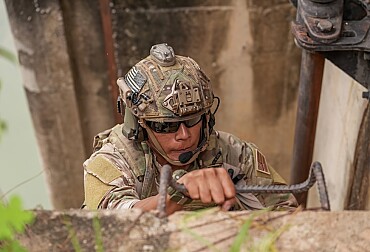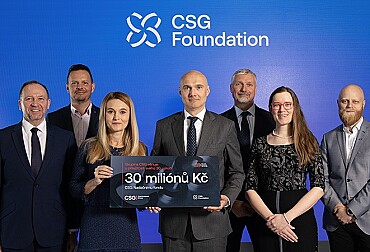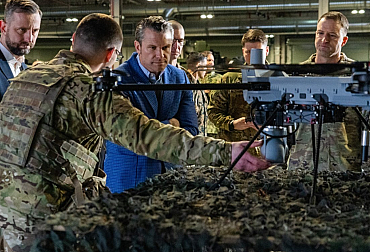Christmas present for the Bundeswehr: The Bundestag Budget Committee approves new military contracts worth €21 billion
German lawmakers across the political spectrum have approved nearly forty new defence projects. A week before Christmas, they agreed to finance these through a special fund for the Bundeswehr (Sondervermögen) and regular budget headings. According to the Federal Ministry of Defence, the approved projects total €21 billion. Among the most significant orders are four new submarines, missiles for Patriot air defence systems, and the preparatory phase for constructing a new class of German frigates.

The end of the German coalition government was marked by a rare show of unity on national security issues. Ahead of the forthcoming Bundestag elections on 23 February, the Federal Budget Committee supported 38 proposals for weapons projects for the air force, navy, and ground forces. The minority coalition government of the SPD and the Greens (Die Grünen) was supported by both the former ruling FDP and the opposition CDU/CSU. German Defence Minister Boris Pistorius (SPD) thanked them for their votes while warning about the threat from Russia under President Vladimir Putin: "We must stand up to Putin's aggression and continue to be able to provide security in spite of it."
One of the most important projects is the purchase of four U212CD (Common Design) submarines, which will bring the total number of submarines in service with the German Navy (Deutsche Marine) to twelve. The Thyssenkrupp Marine Systems vessels will gradually enter active service starting in 2032 and will cost the federal government €4.7 billion (including a spare parts package and training courses). "This acquisition is crucial for the security of NATO's northern wing," explained the German Ministry of Defence.
The U212CD is a diesel-electric submarine with a displacement of 2,800 tonnes, co-developed by Germany and Norway. With a crew of 30 and a length of 72 metres, these vessels are slightly larger than the existing German U212A, of which Deutsche Marine operates six today. In 2021, the two countries committed to ordering a total of six vessels—two for Berlin and four for Oslo. The Norwegians approved the purchase of two additional units in June (official confirmation of the order is pending), while Germany's acquisition of four units awaits contract signing. The German and Norwegian governments hope for cost savings and deeper defence cooperation through this bilateral acquisition process. Jan Christian Kaack, Commander of the German Navy, described the decision to purchase the submarines as a very good day for the submarine fleet and Germany's security: "This decision significantly strengthens our defence capability on NATO's northern flank. Greater range, improved sensor technology, and for the first time the capability to deploy missiles from a submarine."
Johann Wadephul (CDU), vice-chairman of the CDU parliamentary club, also described the acquisition of the U212CD as very welcome and important news for the German Navy. "The importance of modern submarine armaments is evidenced by the numerous reports of threats to our undersea infrastructure and the formidable Russian submarine fleet, which continues to modernise despite the war in Ukraine," he explained. The decision was made by a broad majority across all parliamentary groups, which Wadephul praised: "This shows that we are not losing sight of defence and national security issues during a very challenging election campaign." The budget committee also approved the development of an IDAS (Interactive Defence and Attack System for Submarines) missile for the U212CD submarines on behalf of Deutsche Marine. Funding for the preparatory phase of Berlin's plan to build six F127 frigates has also been approved.
As for the Luftwaffe, €829 million will be spent on modernising stored Taurus cruise missiles. Air defence will receive 120 PAC-3 MSE missiles for Patriot systems at a cost of €763 million, replacing missiles previously sent to Ukraine. In addition, another 128 missiles will be ordered from the US Patriot manufacturer (Raytheon) for just under €870 million. Additional funds have been earmarked for extending the life of IRIS-T missiles produced by the German company Diehl Defence.
The Bundeswehr's ground forces (Heer) will receive infantry thermal imaging systems and Israeli PULS multiple rocket launchers to modernise and enhance the Bundeswehr's deep strike capability. Plans also include equipping the Puma infantry fighting vehicles with reactive armour and purchasing around a thousand new vehicles, mainly trucks. Finally, the Christmas package includes new service uniforms, sportswear, and tactical gear worth €1.3 billion.
Czech companies could participate in some Bundeswehr projects as subcontractors for German arms manufacturers. According to the German think tank SWP (Stiftung Wissenschaft und Politik), it is in the interest of both Berlin and Prague to streamline defence and security cooperation within NATO and the European Union. SWP recommends a strategic dialogue and alignment of defence and arms planning between the two countries. During joint discussions, military capability profiles can be shaped, gaps addressed, and joint projects planned. Air defence is to become a pilot programme, with the Czech Republic participating in the German-led European Sky Shield Initiative (ESSI). Close coordination with Berlin may become a model for other participating countries. The Czechs and Germans could jointly push for at least partial EU funding for ESSI in the medium and long term, thus strengthening EU security policy and NATO's European pillar.
Germany remains one of the Czech Republic's main trading partners within the EU. This has not changed significantly over the last two decades. In 2004 and nearly twenty years later in 2023, Czech companies exported the most to Germany and Slovakia, with Poland coming third last year. Last year, exports to Germany accounted for 32.8% of the total, while exports to Slovakia made up 7.7%. The absolute values of Czech-German imports and exports have steadily increased, roughly doubling over two decades. According to the Czech Statistical Office, exports to Germany are dominated by motor vehicles and related parts (29%), followed by electrical equipment (14.7%) and other machinery and equipment (13.7%). Berlin's recent change in attitude towards the arms industry and defence (Zeitenwende) has great potential to generate demand for new products. Recently approved federal projects worth €21 billion demonstrate how large sums will reach suppliers and subcontractors for the Bundeswehr.
Some Czech arms manufacturers have already joined the global supply chains of German military equipment producers. For example, the Czechoslovak Group (CSG) signed a memorandum of understanding in tactical military vehicles with Düsseldorf-based Rheinmetall at the start of the decade. "Within the framework of this new strategic partnership, both companies will enable the transfer of defence technologies between Germany and the Czech Republic to implement projects in the Visegrad Four countries and beyond," said CSG spokesman Andrej Čírtek to Hospodářské noviny. "We look forward to working with Rheinmetall and firmly believe that our cooperation will be a milestone in modernising the armed forces and the Czech defence industry," added CSG owner Michal Strnad. Rheinmetall already counts on CSG's involvement in its global supply chains, ensuring this cooperation extends beyond individual projects and contracts.
The latest orders worth €21 billion for the Bundeswehr will almost certainly be followed by other major acquisitions. The geopolitical rivalry between Western states and Russia does not appear to be over, and with Donald Trump’s potential return to the White House, pressure on European NATO members to increase their defence budgets is likely. German armament projects represent an opportunity for the Czech industry, which, with early connections to the federal arms supply chains, can access lucrative contracts. The Czechoslovak Group has already paved the way, cooperating with the German armaments group Rheinmetall since 2020.










